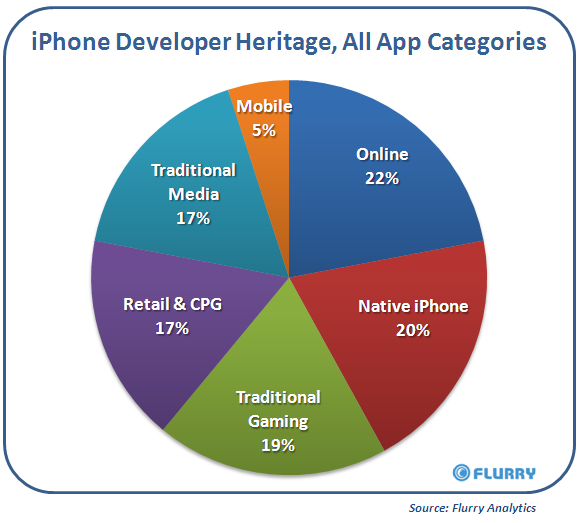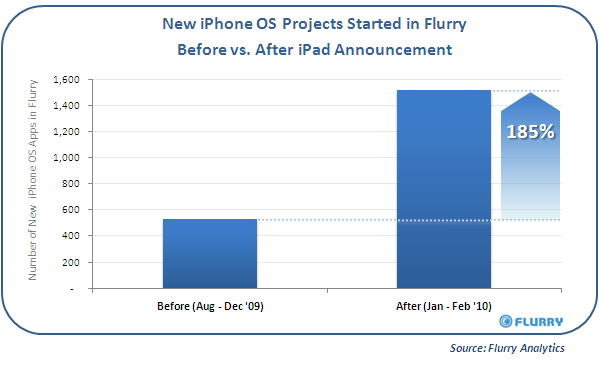Startup developers represent one in five on Apple's App Store
An estimated one in five iPhone developers are companies founded specifically to create applications for the iPhone, according to the latest Flurry Smartphone Industry Pulse survey. That represents the second-largest category of developers behind only preexisting online companies, including giants like Google, Facebook and eBay. Those established brands take up 22 percent of the iPhone developer share.
"This means that the barrier to entry is still low enough for start-ups to enter and innovation to flourish," Flurry noted. "However, those days may be numbered as 'discoverability' has become a significant issue, and now 'marketing muscle' is starting to count more in the App Store."
Now that the iPhone has reached "critical mass" with 70 million iPhone and iPod touch units worldwide, the analytics firm predicted that 2010 will become the year that major brands begin to take over the App Store. This will be further driven by the introduction of the iPad, due to launch on April 3, which has generated interest among traditional media companies in the forms of newspapers, books and magazines.
The third-largest segment of developers, traditional gaming companies like EA and Activision, represent 19 percent of the total developer pie. But those developers also far exceed their presence, garnering 36 percent of the total revenue generation. Native iPhone developers come in second with 21 percent share, while online brands take 14 percent, tied with traditional media.
"Given the specialized skill-set required to build a compelling game, it's no surprise that traditional game companies lead this category, including companies such as Electronic Arts and Activision," the report noted.
Last month, Flurry reported that App Store developer interest had nearly tripled following the unveiling of the iPad. The trend has continued in the latest report, with a "significant increase" in new application starts maintained through the month of February.
Apple has pitched the launch of the iPad as a "whole new gold rush" for developers, as the device and its 9.7-inch screen will run existing App Store software as well as new applications designed specifically for the hardware and its larger touchscreen. First released in January, the iPhone 3.2 beta software development kit allows developers to create iPad-specific software.
The App Store has proven successful for a variety of companies, from upstart developers such as Tapulous, which earns nearly $1 million per month, to established companies like personal navigation provider TomTom, which recorded more than 100,000 sales of its GPS application for the iPhone. In January, Apple revealed that App Store downloads had topped 3 billion less than 18 months after it first opened.
 Neil Hughes
Neil Hughes















 Amber Neely
Amber Neely
 Thomas Sibilly
Thomas Sibilly
 AppleInsider Staff
AppleInsider Staff
 William Gallagher
William Gallagher
 Malcolm Owen
Malcolm Owen
 Christine McKee
Christine McKee










27 Comments
There' still too much garbage to sort through...
There' still too much garbage to sort through...
All that means is that the iPhone is the dominant platform in its respective field. Every dominant platform has plenty (too much) shovelware to sort through. Windows, Wii, PlayStation 2 back in the day, etc. There are some real gems, but not all of the 150,000 can possibly be expected to be of high quality. It's our responsibility as the customer to show these developers what we consider worth our money.
There' still too much garbage to sort through...
Like all else, the bad ones will die and the good ones will prosper. Just have to keep up on review and wom.
There' still too much garbage to sort through...
And what would you suggest to eliminate the garbage?
And while you are at it, how would you get rid of all the millions of garbage applications for Windows, Macs, Linux, etc.
Better yet, how would you tell us if they were garbage?
Wow, the first few replies quoted me. That has to be a personal record for me. I know there is always garbage on all platforms, desktop or mobile, and it's hard to sort through it all. There is no perfect way to filter them out. I know I never look past the top 25 or so in any catagory I browse. I feel if it isn't top 25, it can't be that good for my purposes. I think my issue lies with small developers or those who program by themselves. It's hard for them to compete against bigger, more established companies. The review system also needs a revamping because people sometimes use it as a suggestion box instead of reviewing the substance.